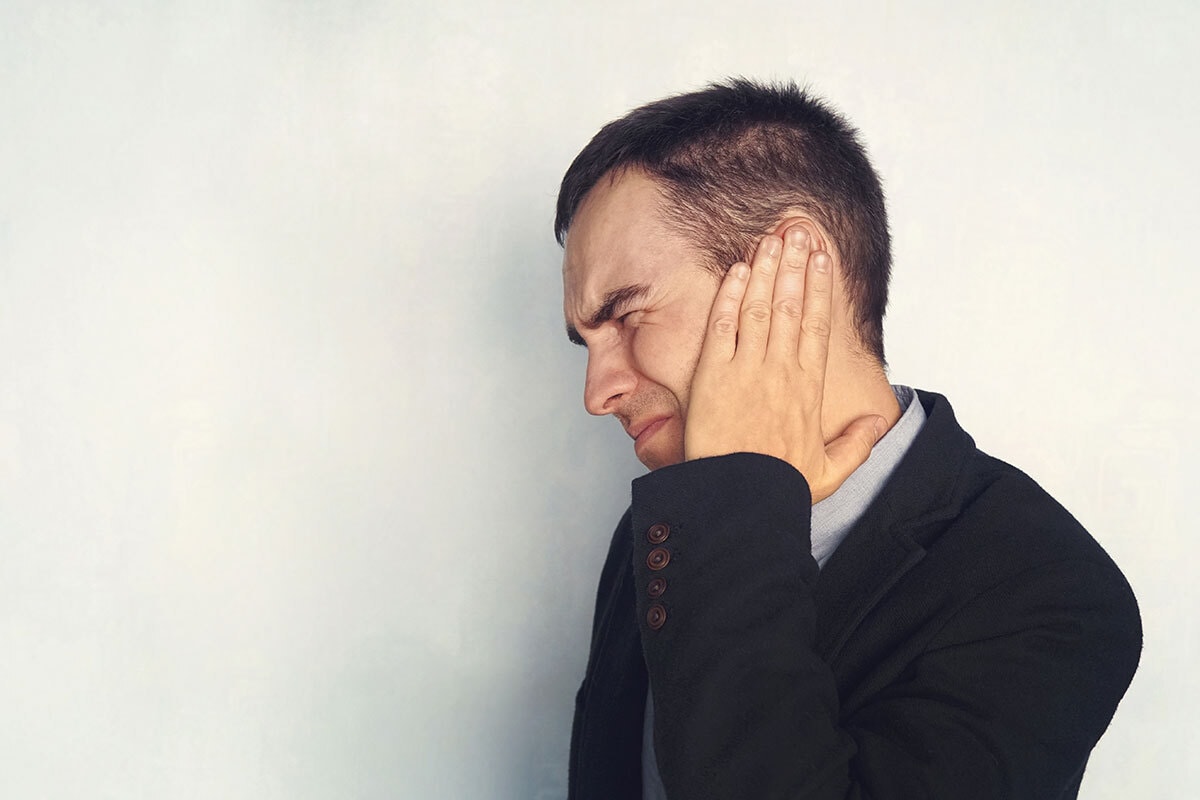Tinnitus is a common condition that affects about 15% of the population. Here, Curakind looks at the evidence for using CBD for tinnitus relief and explains how it works. We even give you some handy dosage guides!
Can cannabis alleviate tinnitus? Read on to see if you too can reduce the ringing…
What is tinnitus?
Tinnitus is a condition that causes a person to hear sounds in the ear without any outside stimulation. This sound can range from a buzzing or ringing to a hissing or whistling sound.
What causes tinnitus?
There are many causes of tinnitus including exposure to extremely intense sounds, aging anxiety, medications and neck injuries
Acoustic trauma induced tinnitus
Acoustic trauma can be caused by exposure to extremely intense sounds and noises, or by trauma to the head.
This type of trauma damages the way the eardrum works. This means that information passed on to the brain becomes scrambled or reduced.
Tinnitus caused by acoustic trauma can be a precursor to severe hearing damage. If this happens it is vital to get medical advice. Failure to treat it could lead to major hearing loss and a need for hearing aids.
Stress-related tinnitus
This can develop when a person is under intense emotional distress. It can be the result of anxiety disorders such as panic disorder and generalized anxiety disorder.
Substance abuse
Chronic alcohol intake or use of Ototoxic drugs can lead to hearing loss and tinnitus.
Medicines
Some medicines can cause side effects such as tinnitus . These include chemotherapy or radiation therapy for cancer treatment, antibiotics and non steroidal anti inflammatory drugs (NSAIDS).
Underlying conditions
Some medical conditions such as Ménière’s disease, diabetes, thyroid disorders or multiple sclerosis can also cause tinnitus.
Tinnitus treatments
Tinnitus Is sometimes mistaken for other medical problems, but it is not a disease, or illness. It can be difficult to diagnose because it’s subjective and self-reported. Once it has been properly diagnosed, it can be treated with tinnitus retraining therapy or cognitive behavioral therapy (CBT).
CBT techniques include removing all noise sources from the environment so that there is a greater contrast between the tinnitus and normal sounds. Treatment may also include tinnitus masking, which uses sound to reduce the disturbing effects of tinnitus.
Tinnitus retraining therapy is a non-invasive treatment system for tinnitus patients. It is a hands-on, practical, and effective treatment that can be done at home.
The goal of this program is to help your brain develop the ability to ignore sensations from your ears. This means that when you have a sensation in your ear, it won’t bother you as much anymore because your brain will have learnt to ignore it.
What is CBD and what does it do?
Cannabidiol (CBD) is one of at least 500 chemical compounds contained in the flowers, leaves and buds of the Cannabis Sativa plant, generally called either marijuana or hemp.
Hemp plants are very similar to marijuana plants, but have much lower levels of tetrahydrocannabinol (THC). This is the chemical compound with psychoactive properties that causes a high for marijuana users.
CBD has been found to alleviate pain, inflammation, anxiety and depression without the side effects of pharmaceutical drugs.
Unlike THC, its fellow cannabinoid, CBD is a largely non-psychoactive compound that does not cause any “high” or “buzz”. It works with the body’s endocannabinoid system (ECS) to help it function more efficiently.
What is the endocannabinoid system?
The endocannabinoid system is a molecular system that regulates and balances many processes in the body. It comprises three main elements: endocannabinoids (cannabinoids that naturally occur in the body), cannabinoid receptors and enzymes. The ECS helps manage a variety of physiological processes including appetite, pain-sensation, mood, and memory; it mediates cognitive functions like attention and awareness of space and time, and is involved in the auditory (hearing) system.
The endocannabinoid system has two main cannabinoid receptors: CB1 and CB2.
CB1 receptors are located all over the human body, but they are most concentrated in the brain and central nervous system. They are also found in the auditory (hearing) system.
CB2 receptors are found mainly in the immune and gastrointestinal system. They can also be found elsewhere in the human body.
A lot of how CBD interacts with the ECS is still under investigation. What is clear is that it slows down the breakdown of our body’s own endocannabinoids, such as serotonin and anandamide (the “bliss molecule”). This lifts mood and gives a feeling of wellbeing. It also affects other neurotransmitters that help with pain and inflammation.
Tinnitus types
There are two types of tinnitus: subjective tinnitus (the most common) and objective tinnitus (which is relatively rare).
Subjective tinnitus is neurological, and produces sounds that only the sufferer can hear. Objective tinnitus, on the other hand, is caused by structures near the ear producing noise. These noises actually “exist”, and therefore can be heard by specialists.
How CBD affects tinnitus and other hearing disorders
At first glance the results for using CBD to treat tinnitus look bad. A 2015 study using CBD to treat tinnitus in lab rats showed it didn’t help, and in some cases made the issue worse. A later 2018 study concluded that “the use of the available cannabinoid drugs to alleviate tinnitus…is premature and not supported by the available evidence.”
However, In 2019, The Hearing Journal published an article by Dr Colucci claiming that whilst CBD might not directly help the symptoms of tinnitus, it did have a therapeutic value in reducing the anxiety and insomnia that accompanies the condition.
He explained: “Patients with severe or debilitating tinnitus are often so anxious it can actually turn into a psychopathology. ‘How do I get rid of it? How do I stop it? Will it get worse? What do I do?’ These worries are often accompanied by insomnia and an inability to concentrate, which can result in severe depression.”
In fact, it is well documented that tinnitus leads to an increased risk of stress, anxiety and depression, so, the multiple studies showing CBD’s effectiveness against these conditions do indeed back up Dr Colucci’s claim that CBD has the potential to manage some of the symptoms of tinnitus.
The benefits of using CBD for tinnitus sufferers
Tinnitus is elusive. It doesn’t always appear in the same form or to the same degree for every patient. This can make tinnitus difficult to diagnose and treat.
CBD provides relief for some tinnitus sufferers, but certainly not all patients who experience tinnitus symptoms. The benefits of CBD may be enhanced by combining it with other natural remedies like essential oils which can improve tinnitus symptoms.
While more research is needed on how exactly CBD works, it is clear that it does affect brain regions and neurotransmitters that play a role in stress, insomnia and depression. As such, it has to be considered as a potential treatment option for those suffering from these conditions as a result of their tinnitus .
How to use CBD for tinnitus relief
The first thing you should do is to choose the CBD that’s right for your needs and symptoms.
This may be topical, as a cream or balm; or oral, as an oil, tincture, edible or flower to be smoked or vaped.
Types of CBD available for tinnitus
CBD is available in many different forms. These include:
CBD oil: These consist of CBD distillate mixed with a carrier oil such as hemp seed oil or coconut oil (MCT), and come in different concentrations of CBD, typically ranging from 2% up to 30% concentration.
They are best administered sublingually (under the tongue). As the effects last in the body for 6-8 hours, these CBD products are best taken 3 times a day to give 24 hour cover.
CBD capsules: These are pills or capsules containing either CBD isolate, or a full spectrum of cannabinoids from the hemp plant. The advantage of capsules is that they are easy to measure and discrete to take. The disadvantage is that they have to pass through the digestive system and therefore take longer to take effect.
CBD edibles: If you don’t want to use a capsule or oil, there are many edibles such as gummy bears, cakes, and biscuits available.
This is a delicious way to relieve tinnitus symptoms such as anxiety and stress. The disadvantages being that they may be fattening (in the case of sweets and chocolates) and like capsules, edibles take longer to enter the system, although the effects are long lasting.
CBD flowers or buds: These are buds that have come directly from the cannabis plant that can be either smoked or vaped. The advantage for tinnitus patients is that this is an extremely effective way of taking CBD and the effects are felt within just a few seconds. The disadvantage is that they also wear off quickly too.
Dosage information and precautions
The dosage information for CBD oil depends very much on the type of symptoms you are trying to suppress, and your own physiology. One person may require very high doses whilst another may require very little. The best advice is to start low and slowly increase the dose until you find what works for you.
There are also some precautions to take with CBD oil.
If you are taking any medications such as blood thinners (like warfarin), anti-anxiety drugs like lorazepam and opioids like morphine then you should consult with your physician or whoever manages your drug administration, beforehand since CBD oil can cause drowsiness and interact in unpredictable ways. This is also the case if you are taking any medications which carry a “grapefruit warning”
It is always wise to talk to a medical professional before taking CBD if you have any other underlying health conditions. Also be sure to monitor the results. If for any reason your CBD product is making your tinnitus worse, stop and get professional advice
CBD is generally considered fairly safe, but it does have a few potential side effects. These include:
- Dry mouth
- Nausea
- Drowsiness
- Changes in appetite
Should any of these occur, lower your dose until they stop.
As medical associations do not regulate CBD products, it is important to buy your CBD from a reputable supplier
Final thoughts
Cannabis and its components (cannabinoids) have been used medicinally for centuries to treat different problems like chronic pain, anxiety, nausea, epilepsy, multiple sclerosis, and even tinnitus.
However this is no miracle cure and despite some people claiming that CBD offers relief, in some cases CBD can actually worsen tinnitus.
What is clear is that CBD is good for alleviating stress, anxiety and insomnia, all major issues for many tinnitus sufferers, so if these are bothering you, this natural hemp extract might be worth a try.
FAQS
How do I get rid of the ringing of tinnitus?
Tinnitus can often be avoided by avoiding loud noises, avoiding alcohol and tobacco, getting enough rest/sleep every night, and following a healthy diet.
Since tinnitus is caused by erratic neural activity in the brain there are also different treatments that attempt to reset this pattern, either with electrical currents delivered directly to the brain or with devices worn on the head.
There are also different treatments that attempt to reset this pattern, either with electrical currents delivered directly to the brain or with devices worn on the head. Some patients have even reported success by using white noise generators which help block out tinnitus sounds in much the same way earplugs would.
What foods help relieve tinnitus?
A diet rich in CoQ10 (an antioxidant found in fatty fish, eggs, nuts and poultry) has been found to increase circulation to the ears.
Apple Cider Vinegar is naturally antibacterial and antifungal and anecdotal reports claim that this could also help.
Can Vitamin B12 cure tinnitus?
Vitamin B12 deficiency can hamper the function of nerves in the ear. Some research studies have shown that people with tinnitus experienced improvement in symptoms after taking vitamin B12 supplements.
What is the best CBD for tinnitus?
The best CBD for tinnitus is one that comes from a reputable supplier and helps you with your particular symptoms. This will vary widely from person to person so it may be a case of trial and error to find the one that suits you best. See here for different types of CBD available .
Why is CBD so popular right now?
Anecdotal evidence claims that CBD is the new “cure all”. Whilst this may not be strictly true, extensive research has shown that it can help relieve conditions such as insomnia, chronic pain, depression and anxiety. Since such a high percentage of the population suffer from one or more of these conditions, use of CBD has skyrocketed in recent years.
Further studies are needed to show the full potential of cannabis products.
How is tinnitus normally treated?
There are several different treatments for patients suffering from tinnitus.
CBT techniques rely on removing all noise sources from the environment so that there is a greater contrast between the tinnitus and normal sounds. Treatment may also include tinnitus masking, which uses sound to reduce the disturbing effects of tinnitus.
Tinnitus retraining therapy is a non-invasive treatment system for tinnitus patients. It is a practical, hands-on and effective treatment that can be done at home.
The goal of this program is to help your brain develop the ability to ignore sensations from your ears. This means that when you have a sensation in your ear, it won’t bother you as much anymore because your brain will have learnt to ignore it.
READ MORE
Full Spectrum CBD oil: what is it and is it worth trying?







